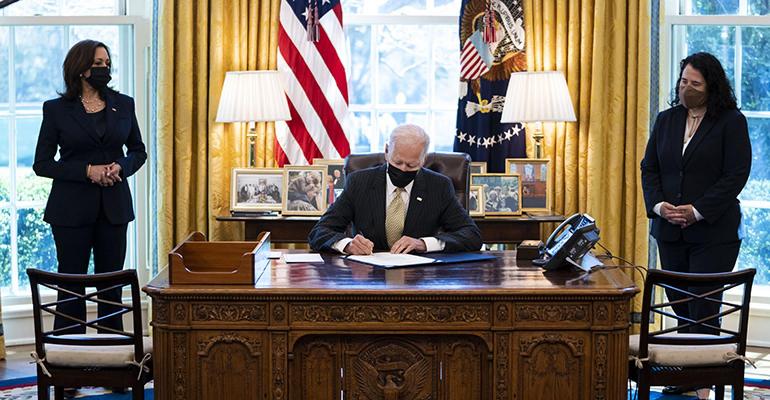Each week, Restaurant Hospitality gathers five stories that impact independent restaurant operations that you may have missed.
Here’s your list for the week of April 5:
- President Biden signs Paycheck Protection Program loan extension into law
On Tuesday, President Joe Biden signed the PPP Extension Act into law, making the deadline for loan application May 31 rather than March 31. The law also gives the Small Business Administration an extra 30 days (through June 30) to process applications.
The deadline extension bill was passed in the House by a vote of 415 to 3 and was approved in the Senate by a vote of 92 to 7.
According to the White House, 3.6 million PPP loans have been awarded by the SBA, 3.3 million of which went to businesses with fewer than 20 employees.
In addition to the deadline extension, the SBA announced on Twitter that applicants to the Restaurant Revitalization Fund grants program would not need to sign up for SAM.gov (System for Award Management) or have a DUNS number (Data Universal Numbering System).
Although the SBA has not yet opened up applications, last week Patrick Kelley, associate administrator for the SBA’s Office of Capital Access, said that will likely happen sometime in April. When applications do open up, eligible restaurant operators will be able to find more information here.
Read more: President Biden signs PPP loan extension into law; application deadline is now May 31
- David Chang’s Momofuku Kāwi closes at Hudson Yards
Yet another Hudson Yards restaurant has announced its closure. David Chang’s Momofuku Kāwi at Hudson Yards in Manhattan announced its permanent closure last week, though it had never reopened after initial COVID shutdowns in March 2020.
The Peach Mart, a consumer-packaged goods stall by Kāwi that also sold goods from Korea, has also closed, as reported by Eater, but chicken sandwich ghost kitchen Fuku is still open for takeout.
The modern Korean restaurant will now be turned into commercial office space, according to a spokesperson for Hudson Yards, and joins the list of Momofuku concepts that closed during the pandemic. That list also includes Nishi, Ando and Má Pêche.
Kāwi’s chef Eunjo Park will now be head chef at Momofuku’s Ssäm Bar — which relocated during the pandemic from the East Village to the South Street Seaport — as it prepares to reopen.
Read more: David Chang’s Momofuku Kawi Closes at Hudson Yards
- The foodservice industry provided big March jobs increase to economy
In the Department of Labor’s March jobs report, the foodservice industry was responsible for the creation of 176,000 jobs out of the 916,000 jobs added to the overall economy. This number is down from 309,000 jobs added in February and still leaves the industry down 2.4 million jobs from this time last year.
Overall, unemployment for bars and restaurants fell from 12.2% to 11.8%. That’s still double the national average unemployment rate of 6%.
Leisure and hospitality saw the biggest increase in jobs created with 280,000 — two-thirds of those being in the food and restaurant sector. The only other part of the economy that saw six-digit jobs growth in March was construction. The food and restaurant industry was the largest sector for jobs growth by 50,000 jobs.
Nationwide, the number of people in the food and restaurant industry who have remained unemployed for over six months increased by 70,000 to 4.2 million.
Read more: The Employment Situation – March 2020
- Doordash sues Olo for alleged overcharging
In a lawsuit filed with the New York State Supreme Court last Tuesday, third-party delivery giant DoorDash accused B2B software company Olo of fraudulently charging them higher fees than their competitors. The lawsuit claims that the fees are in breach of their 2017 contract with DoorDash’s Rails and Dispatch platform, which allegedly says that the fees on their orders would never be higher than those charged to competitor delivery platforms. DoorDash said they will be “seeking punitive damages for fraudulent concealment and fraudulent inducement.”
The lawsuit was filed in response to Olo’s attempt to dismiss DoorDash’s initial claim, which was discovered last year when the company acquired former competitor Caviar and noted that their delivery fees were “significantly lower” than DoorDash’s. If they were charged at the same rate, DoorDash claims they would have saved $7 million in fees.
In addition to potential breach of contract, Olo is arguing that DoorDash breached the “implied covenant of good faith and fair dealing” and is claiming “fraudulent inducement and concealment.”
Read more: DoorDash has sued Olo for fraud
- Bill making cocktails to-go permanently legal in Georgia heads to governor’s desk
Many states have updated to-go cocktail laws during the coronavirus pandemic as a way of helping restaurants capture more revenue as indoor dining was either closed or limited. Though Georgia restaurants can operate at full indoor capacity — and have been able to for quite some time — there is a new law heading to Gov. Brian Kemp’s desk this week that aims to make to-go cocktails legal with some strict regulations.
The bill, SB 236, has already passed the state Congress by wide margins in both the House and Senate. Once signed into law, the bill would allow restaurants to sell up to two to-go cocktails per entrée ordered in sealed containers. Patrons picking up the drinks must then place the beverages either in the glove box, locked trunk or the backseat of a car with no trunk.
Georgia notoriously has some of the strictest alcohol regulations in the country, just allowing alcohol sales on Sundays in late 2018. In late-2020, home delivery of beer, wine and liquor from restaurants, bars, grocery stores and some other retail stores became legal.
Read more: Bill Permitting To-Go Cocktails in Georgia Is Now in the Governor’s Hand





